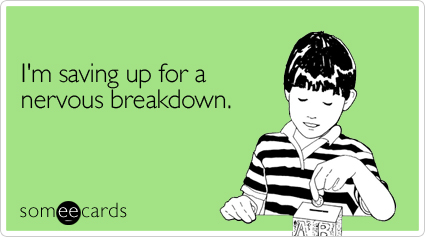Thoughts on Summer Reading
In my early explorations of my predecessor’s desk this past year (he left in rather a hurry), I came across the summer reading assignment he had used the previous year. While I don’t remember the exact details at present, he asked students to complete “author studies” using classic novels. Students had to read two classics and write some sort of essay, due at the start of school.
As summer rolled around this May, I had to come up with a summer reading program for my rising seventh and eighth graders. To be honest, I can’t remember what “summer reading” entailed in middle school. The first year that I actually recall my summer reading assignment was the year I entered high school, 2001. We had to select a book from a list provided–I chose to read Emma by Jane Austen. I am guessing I recognized Jane Austen’s name as the author of Pride and Prejudice, which I assume I recognized as a romance. And who doesn’t like a good romance?
Apparently, me. Or at least, the rising ninth-grade version of myself. That book dragged on. I, who can consume a book in a day, who used to play hooky just so I could stay home and read all day, hated reading that book. I just couldn’t get into it. The characters confused me; the comedy was lost on me. I couldn’t tell Jane Fairfax from Frank Churchill. (That may be an exaggeration. I am pretty sure I was aware of gender differences at the very least.) The point is: I wasn’t ready for it.
I have come to believe that you can’t appreciate a book until you are ready for it. There have been numerous occasions in my own life that I have purchased a book, which has then sat on my bookshelf for weeks, months, sometimes even years. Then, one day, for whatever reason, it catches my attention. When I read it, it speaks to me. It connects to my life, it offers some sort of wisdom. Simply put, I am ready for it.
Leaving middle school, I was not ready for Emma. Though an avid reader (literally, I consumed printed material), I just wasn’t ready to read that novel on my own, and I hated it. I can’t even tell you what it was about, except that Jane Fairfax was a pain in the ass and Harriet was an idiot. (And that’s only what I recall after Googling the names of Emma’s characters.) And it wasn’t just Austen’s style. Just one year later, a sophomore in high school, I picked up the novel Pride and Prejudice, and I LOVED it. I loved the witty humor, the romance. I’m pretty sure I read it twice. That year, I also really enjoyed reading Dickens’s A Tale of Two Cities and Homer’s The Odyssey. Not exactly the lightest of reading. But that didn’t matter, because I was ready for it. And even if I hadn’t been, it was a class venture–we had classmates and a teacher to rely on, to help interpret what we were reading. There were supports for those who needed it.
Summer reading doesn’t really work that way. You’re on your own. More than that, you’re on your own when you’re supposed to be done with school! Most kids don’t want to read A Tale of Two Cities over the summer. Frankly, most simply won’t. They’ll use SparkNotes to get whatever information they need for whatever silly report you’ve assigned, and they’ll BS their way through it. It’s not only a waste of their time, but a waste of YOUR time when you have to read all those essays! And really, do YOU want to do that during YOUR summer break? I would think not.
At least, I think not. So this year for summer reading, I decided to do something different. They can read whatever I tell them to read next school year. This summer, I just want them to read, PERIOD. So I instituted the following Summer Reading Program:

So far, I’ve had some positive responses! I’ve had a student email me, two or three parents respond, AND one even called the principal with praises! Considering MMS is cutting a middle school position, we have a new principal unfamiliar with our work, and I was the last hired, any praise I can get is a good thing right now!! (Though I have to admit it’s my multiple certifications that are keeping me around, commendations can’t hurt.)
Anyway, I don’t know if it’s the “right” thing to do, letting the students select their own books this summer. Maybe I’m expecting too little of them. I know I run the risk of students selecting novels below their reading level, opting for the “easy” way out. Then again, I doubt assigning a weak reader a book way above their reading level without the supports available during the school year is any better. I guess it’s my hope that the students will select the books they’re ready for, whatever subject and level that may be. They can read a little, write a little, and enjoy their summer. We can worry about the classics next fall.
Sincerely,
Ms. Making Things Up As I Go


